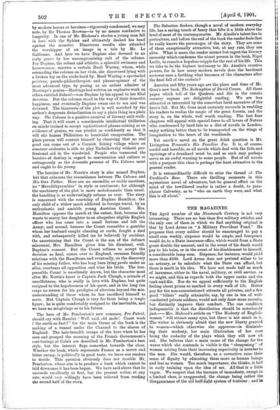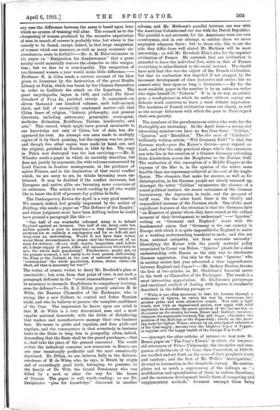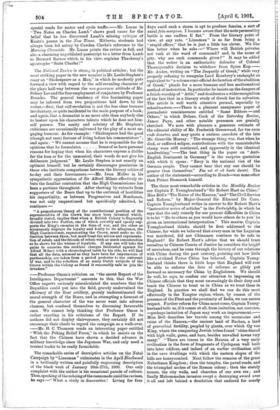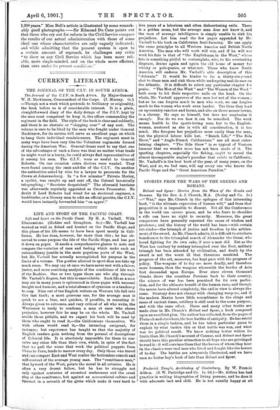THE MAGAZINES.
THE April number of the Nineteenth Century is not very interesting. There are no less than five military articles, and the only one of them in which we find anything original is that by Lord Arran on "A Military Provident Fund." He proposes that every soldier should be encouraged to pay a small sum weekly, sixpence would be ample, and fourpence would do, to a State insurance office, which would from a State grant double the amount, and in the event of his death would pay to his heirs, or in the event of his disablement to himself, a considerable lump sum. Sixpence, for instance, would yield more than 2100. Lord Arran does not pretend either to be an actuary, or to calculate what the State can afford, but there is merit in his idea. We have not made half as much of insurance, either in the naval, military, or civil service, as we might, and this as regards both the upper ranks and the rank-and-file. Nor do we appeal sufficiently to the English feeling about prizes so marked in every walk of life. Better pay for the non-commissioned attracts all privates, and a few good " billets " really attainable, say, by one in ten of well- conducted private soldiers, would not only draw more recruits, but distinctly improve their conduct. The one condition indispensable is that the distribution should be notoriously just.—Mrs. Mahood's article on "The Modesty of English- women" will attract many eyes, but there is not much in it. The writer is obviously afraid that the new liberty granted to women—which otherwise she approves—ia
.their modesty, her main illustration of her case being the audacity of the plays which they will now sit out. She believes that a main cause of the change for the worse which she contends is visible is the " cheapening " of women arising from their increasing superiority in number to the men. She would, therefore, as a corrective raise their sense of dignity by educating them more as human beings and less as women. Too much importance, she thinks, is laid in earll training upon the idea of sex. All that is a little vague. We suspect that the increase of immodesty, except in a limited class, is exaggerated, the change being rather the di.saPPearAnce ef the eld half•light system of training : and in
any case the difference between the Boxes is based upon laws which no system of training will alter. The remark ea to the cheapening of women produced by the excessive exportation of men in search of careers is probably true, but where is the remedy to be found, except, indeed, in that large emigration of women which our manners, as well as many economic cir-
cumstances, seem to forbid A. M. Brice intimates in his paper on "Emigration for Gentlewomen" that a great society could materially remove the obstacles to this emigra- tion ; but we fear he is over-hopefuL The emigration of ten thousand women a year would make little difference.
Professor H. A. Giles sends a curious account of the blow given to literature by the destruction of the great Hamlin Library at Pekin, which was burnt by the Chinese themselves in order to facilitate the attack on the Legations. The
great encyclopedia, begun in 1408, and called The Great Standard of Yung Do, perished utterly. It contained—in
eleven thousand one hundred volumes, each half-an-inch
thick, and full of exeeasively von.densed matter—all that China knew of religion, "history, philosophy, and general literature, including astronomy, geography, cosmogony, Medicine, -divination, Buddhism, Ta,oism, handicrafts, and arts." This record, which, might have proved invaluable to our knowledge not only of China, but of Asia, has dis- appeared for ever. An attempt was once made to multiply copies of it by block printing, but the expense was too great, and though two other copies were made by hand, one, and the original, perished in Nankin in 1644 by fire. The copy in Pekin now destroyed was the last surviving.—Mr. S. Wheeler sends a paper in which he carefully describes, but does not justify by.argument,the wide reforms commenced by Lord Curzon in frontier management, in the guidance of native Princes, and in the diminution of that racial conflict
which, we are song to see, he thinks becoming more em- bittered. It may be doubted if the conflict increases, but European and native alike are becoming more conscious of its existence. The article is worth reading by all who would like to know the drift of present-day politics in India.
The Contemporary Review for April is a very good number. We cannot, indeed, feel greatly impressed by the author of Drifting, who sends a paper on "The Defence of the Empire," and whose judgment must have been drifting before he could have penned a paragraph like this :— " One half of our wonderful reformed Army is to defend England against an invasion - One half of Our Army costs ten million pounds a year to maintain,—a very heavy insurince premium for so unlikely a contingency and for so difficult and d,iingerous an undertaking. Would it not have been better, under those circumstances, to create only the framework of an army for defence : officers, staff, depots, magazines, and, before all, a large supply of guns, rifles, and ammunition wherewith to arm the whole male population? Furthermore, might not, at the present moment, a law easily hive been passed, authorising the King or the Cabinet, in the case of national emergency, to ' commandeer ' the whole population, horses, stores, carts,—in short, all that is necessary for war ? "
The writer, of course, wishes to decry Mr. Brodricic's plan as unscientific ; but, even from that point of view, is not such a paragraph deficient in the "sweet reasonableness" which will be necessary to reconcile Englishmen to compulsory training, even for defence P—Dr. E. J, Dillon greatly admires M. de Witte, the Russian Chancellor of the Exchequer, who is trying, like a new Colbert, to control and foster Russian trade, and who he believes to possess the complete confidence of the Czar. The impression he leaves upon our mind is that M. de Witte is a very determined man and a most capable national housewife, with the foible of disbelieving that traders and manufacturers manage their own business best. He wants to guide and regulate, and does guide and regulate, and the consequence is that everybody in business looks to the State to keep him in prosperity, often, indeed, demanding that the State shall be the grand purchaser,—that is, shall take the place of the general consumer. The result
is that the industrial concerns now numerous in Russia are one year unnaturally profitable and the next unnaturally
depressed. Dr. pillon, we see, believes fully in the disinter- estedness. a- M.-de Witte, who,- he says, is Dutch by origin-
and of exceedingly good birth, belonging, we presume, to the family of De Witt, the Grand Pensionary who was killed by a mob to clear the way for the house of Orange. The paper is well worth reading; as are Dr. Oreightons "plea for knowledge," .discussed in -another column, and Mr. MetJauen's parallel between our war with the American Colonies and our war with the Dutch Republics. The parallel is not accurate, fcr the Americans were our own countrymen, and in our attempt to subdue them we never employed adequate force; but to those who like to see the side they differ from well stated Mr. Methuen will be most interesting; as will Mr. Havelock Ellis's plea for the superior
civilisation a France. He contends that our civilisation is intended to leave the individual free, while in that of France
everything is subordinated to the social instinct. We should have said that this was the object of the French civilisation, but that its realisation was impeded, if not stopped, by the
incessant development 9f class jealousies and envies, but we cannot enter here upon so long a disenssion.—By far the most readable paper in the number is by an unknown writer who signs herself (?) "Cabana." It is, in its way, an artistic gem, a word-picture in which its author, without saying one didactic word, contrives to leave a most definite impression. The hardness of French civilisation comes out clearly, as well as the savage bitterness with which the poor in Paris regard their own poverty.
•
The numbers a the pseudonymous critics who write for the Fortnightly are increasing. In the April issue—a strong and interesting number—we have no less than three: " calchas," " Ignotus," and " Excubitor." The idee mere of Calchas's" brilliantly written article, "Will Germany Fail?" is that the German stock—pace the Kaiser's dictum—must expand or land; and that the only practical shape which this expansion. can take lies in the creation of a Greater Germany extending
from Amsterdam across the Bosphorus to the Persian Gulf. The realisation of this conception of a Middle Empire at the expense of the Slav is, in the opinion of the writer, more feasible than sea-supremacy achieved at the cost of the Anglo- Saxon. The elements that make for success, as well as for disintegrations in the German people are clearly summed up. Amongst the latter " Calchas" enumerates the absence of a sound political instinct, the moral rottenness of the German bureaucracy, the depression in trade, and the prospect of tariff wars. On the other hand, there is the vitality and unparalleled increase of the German stock. One of the moat significant features of the situation is that the Germans have "an Emperor of genius whom they have ceased at the critical
moment of their development to understand."—" Ignotus," writing on "Germany and England," starts with the fundamental axiom that "Germany is the one country in Europe with which it is quite impossible for England to arrive at a working understanding beneficial to each ; and this not from national antipathy, but from economic necessity:" Identifying the Kaiser with the purely material policy enunciated by Count von Billow, " Ignotus" pleads for a close understanding with Russia as the only way to checkmate German aggression. Can this be the same " Ignotus " who in another review last year advocated a close rapprochement between England and Japan?—Mr. Sydney Buxton devotes the first of two articles on Mr. Gladstone's financial career to his work as Chancellor of the Exchequer. The result is a
most interesting appreciation. Mr. Gladstone's picturesque and emotional method of dealing with figures is excellently described in the following passage:—
" While it was often necessary to take his hearers through a wilderness of figures, he varies the way by excursions into greener paths and more attractive scenes. Now with a light touch, now with an impassioned period, now again with solid argument, he discusses the great question of the Income-tax, or discourses on the rivalry between Direct and Indirect taxation ; balances the arguments between Tea and Sugar ; elucidates the position of the Malt-tax or the Paper-duty ; dwells on the grow- ing taste for lighter Wines; alarms by an anticipated exhaustion of the Coal supply; mourns over the blighted hopes of Pepper; or rejoices over the happy health of the foreign Iltg trade."
—Amongst the other articles of interest we may note Mr.
Rees's paper on " The Czar's Friend," in which the ten-year- old utterances of Prince Ukhtomsky, the chronicler and com-
panion of the travels of the Czar, then Czarevitch, in 1890-91, are recalled and set forth on the score of their prophetic truth and- candoar ; and the first' of Mr. Wells's "Anticipations," devoted to locomotion in the twentieth century. He contain- plates not so much a supersession of the railways as "a modification and specialisation of them in various directions, and the enormous development beside them of competing and supplementary methods," foremost amongst these being
special roads for motor and cycle traffic.—Mr. Lucas in Two Notes on Charles Lamb" shows good cause for the belief that he has discovered Lamb's missing critique of Keats's poems in the New Times. Hitherto, students had always been led astray by Cowden Clarke's reference to the Morning Chronicle. Mr. Lucas prints the review in full, and also a charming unpublished postscript to a letter from Lamb to Bernard Barton 'which, in his view, explains Thackeray's apostrophe "Saint Charles!"
The National Review is strong in political articles; but the most striking paper in the new number is Mr. Leslie Stephen's essay on "Shakespeare as a Man," in which he modestly puts forward a view with regard to the self-revealing character of the plays half-way between the non-possums attitude of Mr. Sidney Lee and the free employment of conjecture by Professor Bmndes. The general tendency of this fascinating paper may be inferred from two propositions laid down by the writer,—first, that self-revelation is not the less clear because involuntary, or quite incidental to the main purpose of a book; and again, that a dramatist is no more able than anybody else to bestow upon his characters talents which he does not him- self possess. The sanity and sobriety of Mr. Stephen's criticisms are occasionally enlivened by the play of a most en- gaging humour. As for example: "Shakespeare had the good (though not rare) fortune of living before his commentators"; and again : "We cannot assume that he is responsible for the opinions that he formulates Some of us have personal reasons for hoping that when his characters express a dislike for the lean or for the =musical, their words do not give his deliberate judgment." Mr. Leslie Stephen is not exactly an optimist himself, but he certainly discourages pessimism in those who institute comparisons between the literary critics of to-day and their forerunners.—Mr. Iwan Milner in his sympathetic appreciation of Sir Alfred Milner effectively re- buts the familiar contention that the High Commissioner has been a partisan throughout. After showing by extracts from supporters of the Boers that up to the outbreak of hostilities his impartiality, as between Progressives and Bondsmen, was not only unquestioned but specifically admitted, he continues :--
"A preposterous theory of the constitutional position of the representative of the Crown has since been invented which, broadly stated, implies that when a British Colony is flagrantly divided into two Parties, one of which covertly and openly sup- ports the King's enemies in the time of war, and the other as strenuously displays its loyalty and fealty to its allegiance, the High Commissioner, representing the Crown, must make no dis- tinction between them, but must treat the advice and representa- tion of rebels and the friends of rebels with as much consideration as he shows for the wishes of loyalists. If any one will take the pains to examine the reckless charges fabricated against Sir Alfred Milner with a chronological table by his side, he will find that all the data, misused as they have been for imputations of partisanship, are taken from a period posterior to the outbreak of war, and to the rebellion of as many Dutch subjects of the Crown within the Colony as found it reasonably safe to join the invaders."
—Professor Oman's criticism on "the secret Report of the Intelligence Department" amounts to this, that the War Office experts seriously miscalculated the numbers that the Republics could put into the field, gravely undervalued the efficiency of the Boer artillery, grossly underestimated the moral strength of the Boers, and in attempting a forecast Of the general character of the war never went into adverse chances, but confined themselves to discussing favourable ones. We cannot help thinking that Professor Oman is rather exacting in his criticisms of the Report. If its authors did not display clairvoyance, they certainly did not encourage their chiefs to regard the campaign as a walk-over. —Mr. H. C. Thomson sends an interesting paper entitled "With the Peking Relief Force," in which he insists on the fact that the Chinese have shown a decided advance in military knowledge since the Japanese War, and only need a trusted leader to be really formidable.
The remarkable series of descriptive articles on the Natal
Campaign by "Linesman" culminates in the April Blackwood in a brilliantly written and painfully engrossing description
of the black week of January 20th-27th, 1900. Our only complaint with the author is his occasional parade of culture. Thus, speaking of the echoing of the cannonade amid the ravines, he says:—" What a study in diacoustics ! Living for four
days amid such a storm is apt to produce fancies, a sort of aural fata morgana. I became aware that the note permeating battle is one endless E flat." From the literary point of view, at any rate, " Linesman " is so far from being a "stupid officer," that he is just a little too clever. We like him better when he asks :—" Where will British privates not rush at the word of command? and, in the name of pity, why are such commands given ? " It may be added that the writer is an enthusiastic defender of Colonel Thorneycroft's decision to withdraw from Spion Kop.— Mr. Auden, writing on "The Jeopardy of Greek," while very properly refusing to recognise Lord Rosebery's onslaught as equivalent to "a solemn semi-official declaration of the abolition of Greek," pleads for a more humane and less mathematical method of instruction. 112 particular he insists on the dangers of a fetish-worship of "Attic," and desiderates a wider recognition of the fact that in a literary study of Greek lies its salvation. The article is well worth attentive perusal, especially by schoolmasters.—There is a pleasant anonymous paper of journalistic reminiscences entitled "Some Editors — and Others," in which Delane, Cook of the Saturday Review, James Payn, and other notable pressmen are genially sketched. We note with pleasure a generous estimate of the editorial ability of Mr. Frederick Greenwood, far too soon rude donatus, and may quote a curious anecdote of the late Mr. Grenville Murray: "The strange thing was, that when he died, or suffered eclipse, contributions with the unmistakable stamp were still continued, and apparently in the identical handwriting."—The best thing in the paper on "Anti- English Sentiment in Germany" is the surprise quotation with which it opens : "Envy is the national vice of the German people. They cannot bear that any one should be greater than themselves." Fee est et ab hosts doceri. The author of the statement—according to Busch—was none other than Prince Bismarck himself.
The three most remarkable articles in the Monthly Review are Captain F. Younghusband's "Sir Robert Hart on China'," Miss Bell's "The Ruins of the Hauran," and "The Civil Service and Reform," by Major-General Sir Edmund Du Cane. Captain Younghusband writes in answer to Sir Robert Hart's "instructive series of articles" in the Fortnightly, in which he says that the only remedy for our present difficulties in China is to let "Do to others as you would have others do to you' be given an international interpretation." This maxim, Captain Younghusba,nd thinks, should be first addressed to the Chinese, for while we believed that every man in the Legation was murdered, did not Chinamen continue to be safe in England? Sir Robert Hart's advice that we should trust ourselves to Chinese Courts of Justice he considers the height of unwisdom, and he runs through the history of our relations with China during the past century, pointing out how little like a civilised Power China has behaved. Captain Young- husband thinks there is little hope that England will ever be able to enforce the lists of reforms so glibly put forward as necessary for China by Englishmen. We should do well, he says, to confine our attention to impressing on Chinese officials that they must unceasingly do their duty and teach the Chinese to treat us in China as we treat them in England. In practice we shall find we can do this most effectually in the Yangtse region, where, by reason of the presence of the Fleet and the proximity of India, we can secure respect. Further reform for China must come, Captain Young. husband tells us, if it comes at all, from imitation, not coercion, —perhaps imitation of Japan may work an improvement.— Miss Bell describes her travels among the mountains and ruins of the Hauran,—the ancient land of Bashan, a land of proverbial fertility, peopled by giants, over which Og was King, where the conquering Jewish tribes found "cities fenced with high walls, gates, and bars, besides =walled towns very many." "There are traces in the Hann.= of a Very early civilisation in the form of fragments of Cyclopean wall built into later edifices, and indeed of an earlier civilisation still in the cave dwellings with which the eastern slopes of the hills are honeycombed. Next follow the remains of. the great Nabathalan Kingdom; then the temples, the paved roads, and the triumphal arches of the Roman colony; then the stately houses, the city walls, and churches of our own era ; and finally Mahommedan invasion swept a destroying sword over it all and left behind a desolation that endured for nearly
1,300 years." Miss Bell's article is illustrated by some remark- ably good photographs.—Sir Edmund Du Cane points out that those who cry out for reform in the Civil Service compare the results of our actual administration with those of some ideal one whose characteristici are only vaguely indicated; and while admitting that the present system is open to a certain amount of reproach, he challenges any critic "to show us any Civil Service which has been more reli- able, .moie single-minded, and on the whole more efficient, than ours under its present conditions."









































 Previous page
Previous page